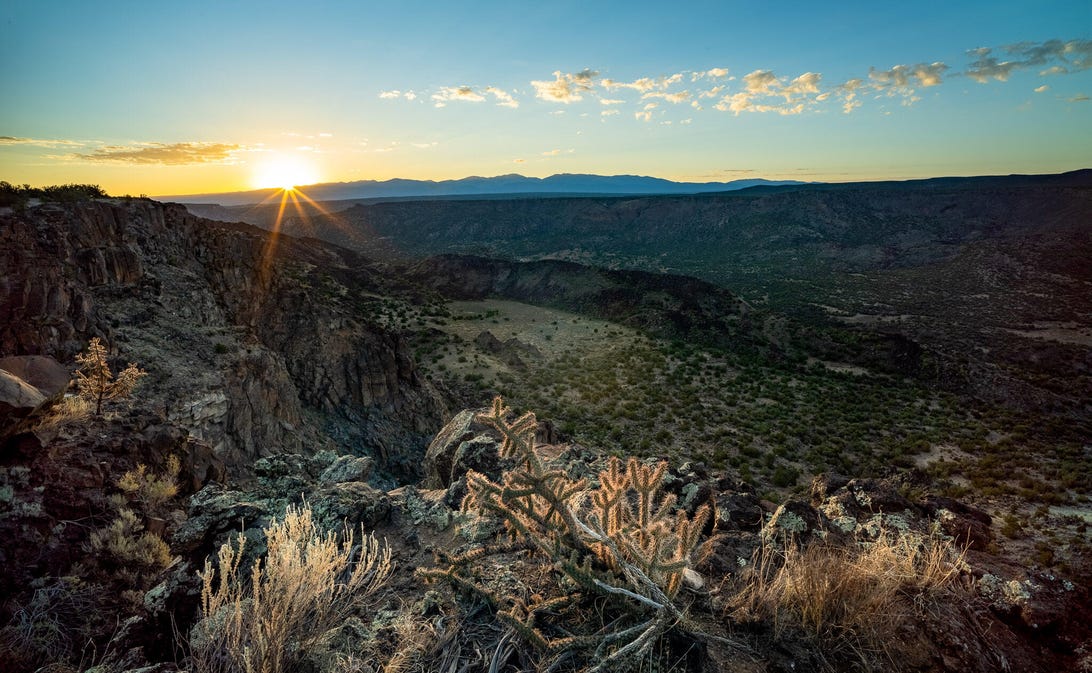
A sunrise in New Mexico.
Stephen Shankland/CNETIt should have been such a great moment: the entire US Senate showing bipartisan support for an issue that affects all Americans. Instead, the March 15 vote to set US clocks on permanent daylight saving time got me worried that my family will enter a new dark age in 2023.
The bill, introduced by Florida Republican Sen. Marco Rubio and co-sponsored by 18 others from both sides of the aisle, is called the Sunshine Protection Act. That name is nonsense, of course; no legislation can change how long the sun is up each day. It would change how we experience that daylight, and that's what I don't like, especially when it's scarce in winter.
In the winter, the bill would force kids to wake up, get dressed, eat breakfast and get to school long before the sun has risen. There are also health and safety concerns, and no clear majority of citizens is as enthusiastic about permanent daylight saving time as a bunch of senators.
The idea behind permanent daylight saving time is that extending daylight hours in the evening will mean people will be inclined to stay out later, spending more money on restaurants, shopping and entertainment.
In advocating for the bill, Rubio extolled the virtues of kids playing outside instead of vegging out in front of a screen. "You want the ability to spend more time in the evenings outdoors," Rubio said in a hearing about the bill. Added Massachusetts Democrat Ed Markey, "Getting that extra hour of sunshine into people's lives is essential," arguing it makes people happier, cuts traffic accidents and increases economic activity.
Of course, there is no "extra hour of sunshine" in the day. Some of us might experience more sunlight -- in particular, those people who can roll out of bed at 9 a.m. and stay out late -- but morning joggers and parents will know exactly where that "extra hour" came from.
If you want to see the effect permanent daylight saving time would have on sunrise times county by county in the US, check the Washington Post's detailed map. Andy Woodruff also published an interactive tool that shows full-year statistics on sunrises and sunsets.
In western parts of some time zones, wintertime sunrises on permanent daylight saving time will be after 9:30 a.m. In Seattle, where my coworker Laura Hautala and fellow perma-DST opponent lives, it will be as late as 9 a.m.
Objections to permanent daylight saving time
More daylight saving time objections come from health experts, many of them already concerned about how poorly suited early-morning school is to students' natural sleep cycles. A 2019 study concluded "an extra hour of natural light in the evening reduces sleep duration by an average of 19 minutes." Sleep deprivation increases medical problems like cardiovascular disease, according to the American Academy of Sleep Medicine: "Daylight saving time is less aligned with human circadian biology."
"Research shows that the hour of morning light we miss out on under DST is unhealthy for your body and mind," Horacio de la Iglesia, a professor of biology at the University of Washington, told the Seattle Times.
One of the original reasons for daylight saving time, to save energy, is marginal at best. Research in 2017 examining 44 studies found overall electricity savings of 0.34%.
The US moved to permanent daylight saving time with a 1973 law designed to save energy but dumped the effort less than a year later in 1974 as public opinion on the idea soured.
Indeed, the American public itself is perhaps the biggest obstacle to a permanent daylight saving time. US residents show no love for changing the clocks twice a year, but 43% would prefer permanent standard time to the 32% who want permanent daylight saving time, according to a 2021 Associated Press-NORC poll.
Thin political support for daylight saving
The swift, decisive Senate vote surprised and worried me. It signaled broad support for a policy I despised.
But it turns out the vote wasn't as unanimous as it initially appeared. The Senate's rules allow a bill to pass with "unanimous consent" if no senator objects, and none did apparently, because some senators didn't even know about the bill.
And bills don't become law until the House of Representative also passes a bill, the two houses of Congress resolve any differences in conference committee meetings and the president signs the bill. So far, the House looks more cautious, with some representatives showing a desire to actually debate the DST issue, and the White House hasn't displayed any great enthusiasm.
In other words, it doesn't look like the rest of the US government will act as rapidly as the Senate. Good.
A new cultural divide?
We have plenty of cultural divides these days beyond just the gulf between Democrats and Republicans. iPhone versus Android, New York Yankees versus Boston Red Sox, Ford versus Chevy, gaming PCs versus consoles. The Senate's unanimous passage of the permanent daylight saving time may have bipartisan support, but it glossed over another split: daylight savers versus standard timers like me.
Plenty of people do like DST, and they're not necessarily unhinged or irrational. One Seattleite I spoke with finds winter days dark and overcast regardless but hates being awakened by bright sun early in summer mornings. Another shares my displeasure at getting kids to school in the dark.
I hate to say it, but I don't see any easy solution. I loathe changing the clocks, but I'd rather have a few months of standard time a year than none.
"Idea" - Google News
March 23, 2022 at 07:00PM
https://ift.tt/6vQIVMy
Permanent Daylight Saving Time? Bad Idea, and Here's Why - CNET
"Idea" - Google News
https://ift.tt/PxhpqF3
https://ift.tt/9DPz6Ln
Bagikan Berita Ini














0 Response to "Permanent Daylight Saving Time? Bad Idea, and Here's Why - CNET"
Post a Comment